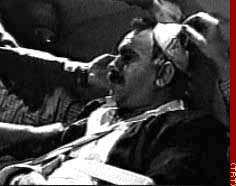
 |
|
| Turkish video of Ocalan's February 16 capture from the Greek embassy in Kenya | |
Abdullah Ocalan is being tried under the authority of an Ankara State Security Court, one of 12 such institutions in the country.
Under Turkish law, these judicial institutions handle cases involving crimes against national security, including drug trafficking cases and various political offenses, such as treason.
The courts have a three-member judiciary panel comprised of a military officer and two civilian judges.
The Turkish government has repeatedly assured the international community that Ocalan will have a fair trial, despite the presence of a military judge. Ankara says that the Turkish judiciary is an independent body that guarantees free and fair legal proceedings.
But international lawyers, particularly from Europe and the United States, have raised serious concerns about incorporating a military figure in the security courts' judiciary panel, arguing that these officers cannot possibly be independent and impartial.
The European Court of Human Rights in Strasbourg, in fact, has repeatedly ruled in cases against Turkey that the presence of the military judge violates the European Convention for the Protection of Human Rights and Fundamental Freedoms, which Ankara ratified in 1954.
One of Turkey's top security bodies, the National Security Council, has recently raised the issue of dropping the military judge. But even though a debate about the issue has been started, the political will to implement the necessary constitutional amendment seems to be largely absent, or at least blocked because of rival political agendas.
There is another major point often criticized by both international lawyers as well as defense lawyers practicing within Turkey: the protracted period of pretrial detention.
Under current regulations, lawyers defending their clients in a State Security Court can be denied access to their client for up to four days of the detention period, which is the interrogation phase.
In the troubled southeast of Turkey, where Kurdish separatism is mostly based, this period can be extended to seven days. And in the case of Ocalan, lawyers did not get to talk to their client until 10 days after his arrest.
Access to counsel is important for the defendant during the detention period since many prosecutions in State Security Court cases are based on statements taken from the accused during this pretrial phase.
In line with prevailing practice in international human rights law, lawyers outside Turkey and some within the country have been calling for allowing access to a client within 48 hours after arrest or detention.
Some State Security prosecutors have expressed their willingness to discuss the issue and have signaled an open mind toward instituting reform.
Turkish defense lawyers who have represented suspected supporters of Ocalan's Kurdistan Workers Party -- which Ankara considers a terrorist organization trying to undermine the state -- have also complained of being threatened and insulted by officials at the State Security Courts.
"If lawyers can be beaten in the courthouse, then everyone's rights are threatened," said one lawyer of the Istanbul Bar Association, Turkey's largest legal organization, in an interview in 1998.
One of the lawyers who was allowed to see Ocalan on Imrali prison island said that he and his relatives had been threatened because of his defense work for the PKK leader.
"I could be killed," said the lawyer Ahmet Zeki Okcuoglu, accusing the government of not being able to guarantee his safety. Okcuoglu also frequently complained that he was not given time for unsupervised talks with Ocalan.
But Ankara has firmly rejected such allegations and repeatedly reassured the
international community that, as a state of law, Turkey will continue to meet the
requirements of international standards of law.